Dan Auerbach: “There’s something about playing that electric guitar real loud that feels like home”
The Black Keys guitarist discusses his renewed love for plugging-in on the duo’s raucous ninth record, Let’s Rock
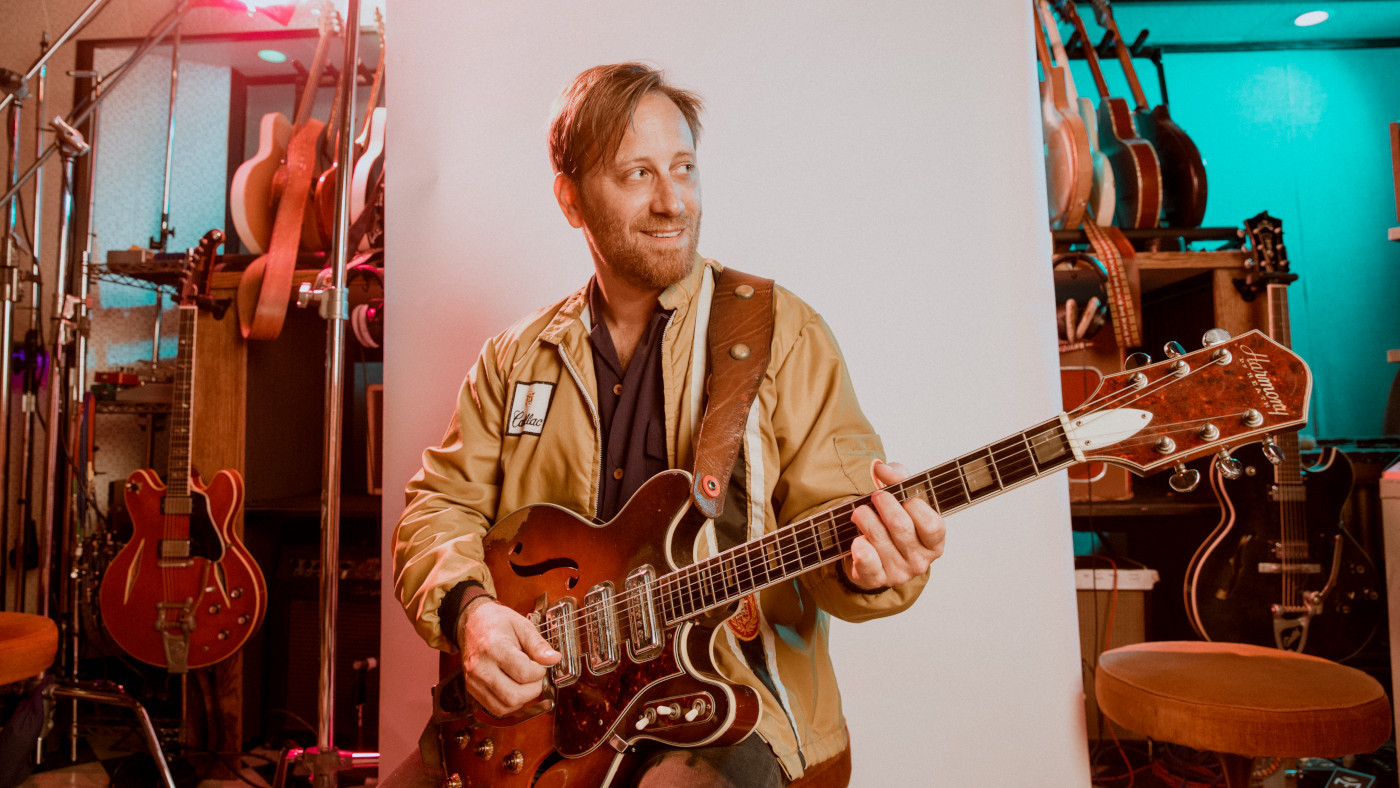
The Black Keys’ new album Let’s Rock is unashamedly an electric guitar record. From the first seconds of opener Shine A Little Light it’s a reckless, crunching rock ’n’ roll album, full of unhinged leads, strange textures and rattling, heavy riffs.
It also represents a trip home for Dan Auerbach. The guitarist is now a Nashville resident but the album buzzes with the “weird”, wild Northeastern Ohio rock music and raw electric blues that obsessed him throughout his teens in Akron - the music that motivated him to stray far enough from his family’s bluegrass jams to pick up the electric.
It is the sound that nourished his addictively wild, off-the-cuff playing style. The sound that, a few short years later - combined with the shuffling, equally idiosyncratic drumming of his co-conspirator Pat Carney - would take the duo from Ohio Nowhere Boys to the biggest rock group to form since the turn of the millennium.
I think my relationship with the electric guitar was formed early on, just being from Northeastern Ohio - there’s just rock ’n’ roll there
Your musical roots were initially in bluegrass and playing with your family. How did your relationship with the electric guitar begin?
“I think my relationship with the electric guitar was formed early on, just being from Northeastern Ohio - there’s just rock ’n’ roll there, there always has been. From the 1950s payola rock ’n’ roll shows in Cleveland, to people like Glenn Schwartz, who was the original guitar player for The James Gang [known for hits like Funk #49], before Joe Walsh. He played in Cleveland every Thursday and I used to go see him. I saw Link Wray in Cleveland, too. I just had these influences around me, all the time.”
Glenn Schwartz was a big influence on you, but he is not well-known outside of Ohio. Can you tell us a bit about him...?
“He was a crazy-assed rock ’n’ roll player. One of the originals. He was the guy that made Joe Walsh wanna play fucking guitar! I mean, do you need to say anything else? [Laughs] And didn’t Joe Walsh sell Jimmy Page his first Les Paul? The six degrees of Glenn Schwartz is kind of epic! I used to go see him in Cleveland at this little bar, but he still played with the same kind of intensity and volume as he had if he were playing in front of 60,000 people at the Atlanta Pop Festival in 1969, which he did.
Want all the hottest music and gear news, reviews, deals, features and more, direct to your inbox? Sign up here.
“The same setup that I use in Black Keys is the one that I saw Glenn Schwartz using when I was 17. He played a Fender Quad Reverb with an extension 4x12 cabinet - so he was playing eight 12” speakers, in a bar that held about 80 people! He would play with a drummer and a bass player and it sounded like Cream at the Royal Albert Hall - and that’s what I got to go and see every week. I just had these incredible moments with the electric guitar, growing up, being in Northeastern Ohio. It just really shaped me and the way that I view it.”
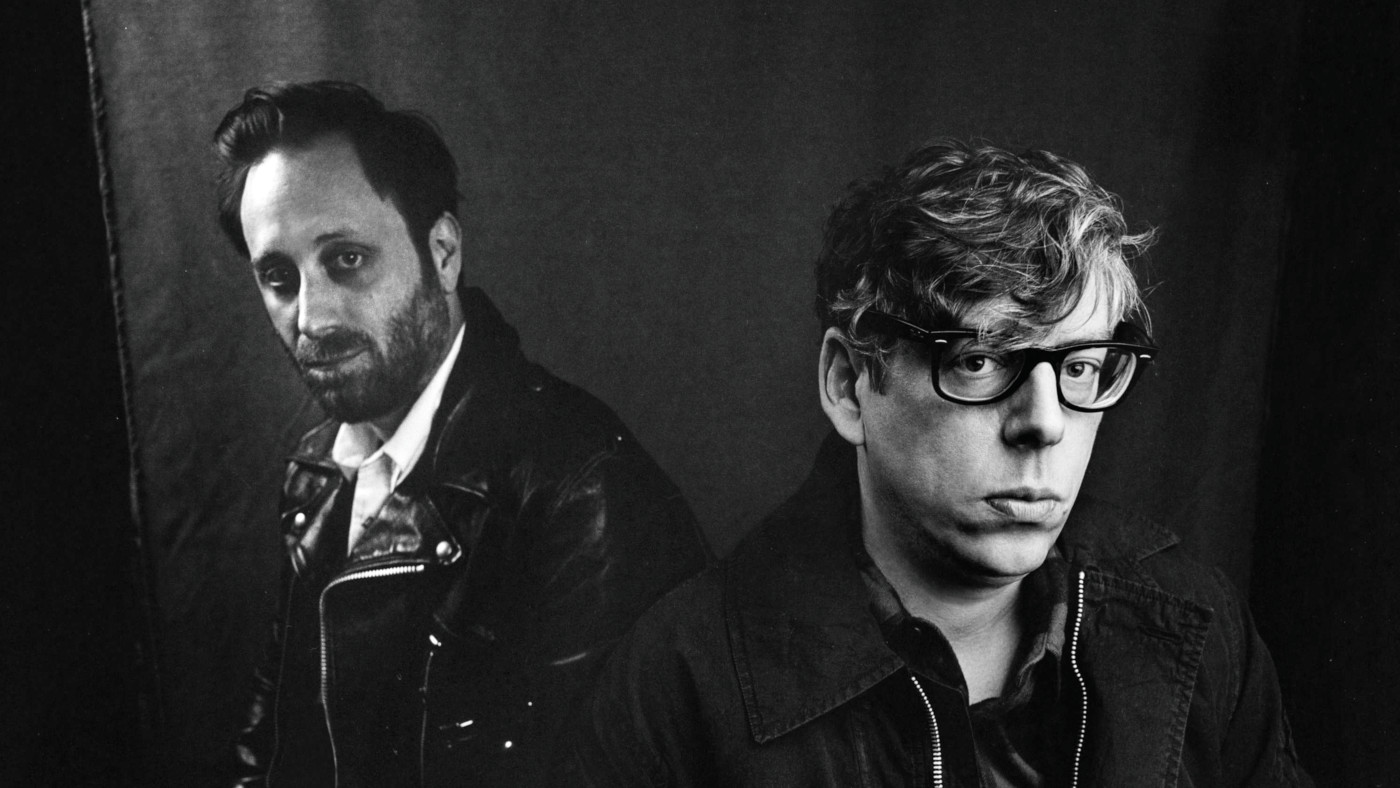
An enduring relationship
How has your relationship with electric guitar changed since those early days?
“I definitely went in and out of interest with the electric guitar. I took some time off [after Turn Blue] and I did that record Waiting On A Song and I was playing acoustic guitars, so I wasn’t around it for a long time. For years. But then I recorded Glenn Schwartz.
“I invited him down to Nashville three years ago. Joe Walsh came in and we made a guitar record, with Glenn - with our hero. It gave me the same tingly feeling that I had when I was 18 going to watch Glenn play the electric guitar. It made me excited to play electric guitar again and, shortly thereafter, I booked The Black Keys sessions and we made the new record.”
We wanted to make a rock ’n’ roll record. I’d just made a record with Glenn Schwartz and Joe Walsh, you know?
So, given the prominence of the electric on Let’s Rock, what guitars were you using for the record?
“I used a couple of guitars, but one I used a ton was a Guild Starfire III, with the mini-humbuckers. There’s a really specific time period where they were really good. It’s like from ’63 to ’67. I got one of those and I had it set-up at Gruhn’s in Nashville and it is just a horse. It is a motherfucker. It’s so good.
“Then I also played a Gretsch Chet Atkins a bunch, with the humbuckers in it. I’d never played Gretsch humbuckers and I’d never played Gretsches, so I didn’t realise that it’s the sound of that big, AC/DC-type rock ’n’ roll chord. It had never really dawned on me. So I got into that one on this record and I use that guitar all the time - it’s just a real player. That guitar’s name is Rudy. It’s a one-owner guitar. I bought it from the family of the original owner and he played the shit out of it, so it’s got a real soul to it.”
You’ve got a pretty incredible vintage amp selection at Easy Eye Sound. Were there any you found yourself going back to a lot?
“Well, I was using my Flot-A-Tone [a rare US brand that was based in Milwaukee, Wisconsin and built hand-wired valve amps from the late 1940s to mid 1960s - Ed], which I’ve used pretty much forever. I’ve got a couple of different Flot-A-Tones that I use. Then I used a Deluxe Reverb - a silverface Deluxe Reverb. I prefer the silverface for rock ’n’ roll-type stuff. Blackfaces are really nice and pretty and they’re really versatile, but I don’t need to be versatile. Not all of the time, anyway!”
There are a lot of unusual tones and textures on Let’s Rock, but they all seem guitar-driven. Did you purposefully restrict yourself to guitars this time?
“There’s not a single keyboard on the record. Walk Across The Water has a synth sound, but it’s built into the drum machine that we were using, so even that wasn’t on a keyboard. And, yeah - it was on purpose. We wanted to make a rock ’n’ roll record. I’d just made a record with Glenn Schwartz and Joe Walsh, you know? So that inspired me to want to keep it simple and Pat was way into it. We just stripped it down and approached it the way we approached the first couple of records - just the two of us, just sitting down and seeing what happened.”
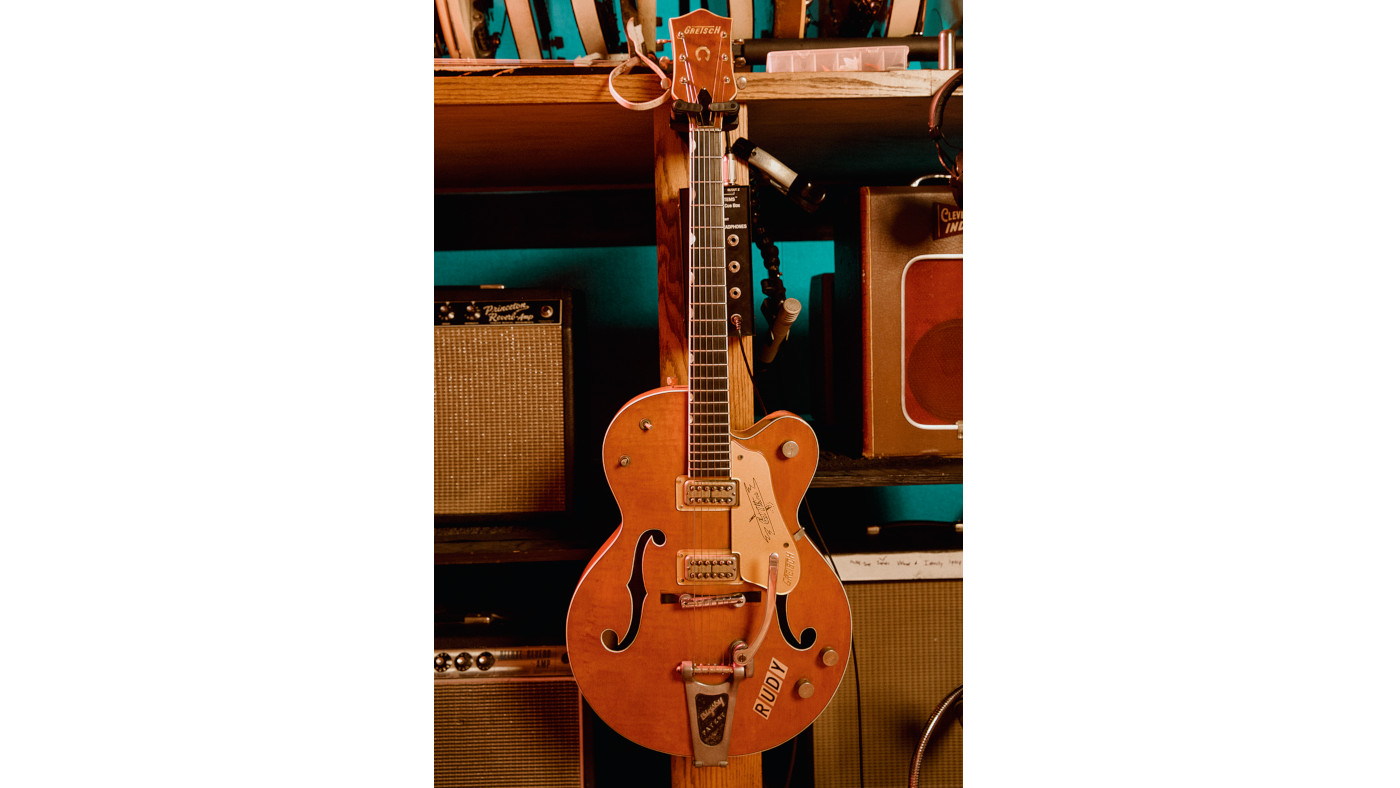
Letting go
How did you find it when you reconnected with Pat after such a long break?
“Well that, for me, has always been the magic of The Black Keys. We never really need to talk ahead of time. We just meet up at the same time in a place that has microphones and we can make music. That’s always how it’s been with Pat, from the first record to this one.
“I don’t know why but it’s always been effortless, really. Like, how many artists do you talk to that used to take the school bus together? We’ve known each other since before we played instruments and that’s how far we go back. Being on the road can really zap the creativity and the fun out of anything.
“But I think this record was more like our earlier records because when we made those records we were never on tour. There was no pressure and we got to just have fun and do what we were always good at.”
You have to let go. It’s a weird person that wants to get good at something, but not too good, [yet] that’s sort of always in me!
Your friend Billy Gibbons told Guitar World in 2012, “What I enjoy about watching The Black Keys is the sense of abandon.” How do you tap into that as players?
“You have to let go. It’s a weird person that wants to get good at something, but not too good, [yet] that’s sort of always in me! I love people like Lightnin’ Hopkins and Link Wray, but understand that if either of those guys had ever been taught any musical theory, it probably would have fucked their whole sound up.
“It’s like, ‘How much do you really wanna know? What are you trying to accomplish in your life? Do you wanna be a jazz teacher? What do you want to do?’ My heroes were always so simple, in a way, that I always stayed well away from that kind of stuff. I’m happy to just use my ears.”
Lightnin’ Hopkins has that same recklessness that has become part of your DNA as a player. What was your introduction to the blues?
“Well, my dad used to play the Robert Johnson and Son House recordings all the time when I was a little kid. Then my Uncle Tim, who played harmonica, was a blues fanatic. He hooked me up with Lightnin’ Hopkins and then he taught me about Frankie [Lee] Sims, Guitar Slim... Everybody, basically.
“I really got into that stuff, but because I got into Lightnin’ Hopkins first, I was always really attracted to the simplified, broken-down blues stuff and nobody really did that - until Fat Possum started to put out records [in the 90s]. That was right about the time that I was in high school and I gravitated towards that and the Junior Kimbrough records and I used to do the Fat Possum Juke Joint Caravan [tours]. I used to go out and see RL Burnside, Elmo Williams and Hezekiah Early, Paul Wine Jones, Robert Belfour, CeDell Davis, T-Model Ford... It was like those old blues recordings were coming to life right in front of my eyes, at a really crucial time for me.”
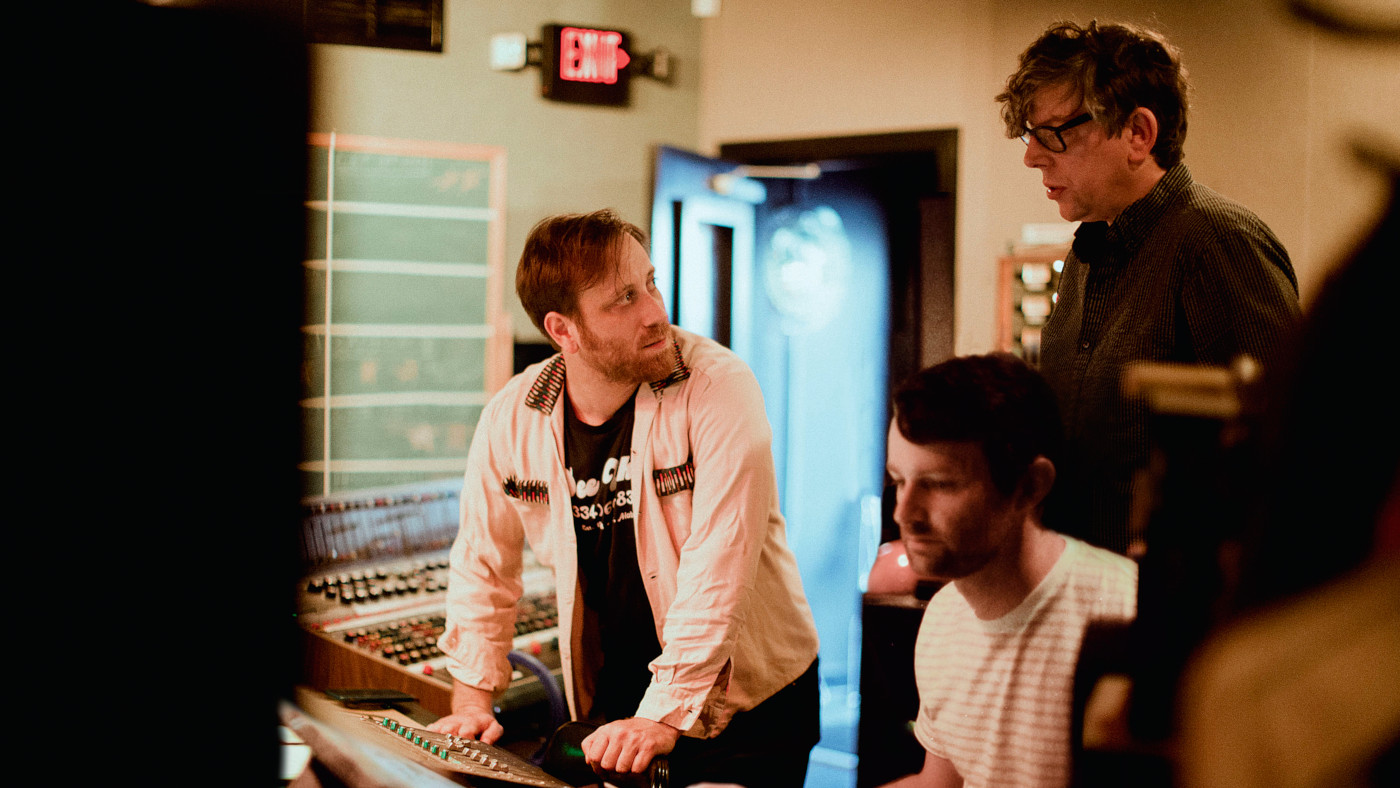
Electric dreams
We read that around that time you’d also go to the public library to access video tapes of old blues players...
“Oh yeah, I would get all the Lomax videos [field recordings of blues musicians] and all the Yazoo Records. Yazoo had all the great stuff, like Furry Lewis, Lightnin’ Hopkins... and I could go and get all of that stuff for free. I don’t know how people listen to Robert Johnson records and figure out how to play it! That just seems crazy to me.
“But being able to see Fred McDowell play - to watch his fingers and be able to see what his right hand was doing and see his slide and be like, ‘Oh, it’s not a full-length slide, it’s just a little short thing’ - was really eye- opening, literally and figuratively! People are so spoiled now by YouTube that they don’t even think about it, but I used to have to go down to the library.”
The electric guitar has given me everything I have! Honestly. It’s made me millions of dollars. It’s bought me my studio, my house, my cars. It’s put my kids through school
Which blues guitarist would you recommend to readers?
“I think everybody has to go down their own little path. You have to listen to the music for yourself. I think that’s the point when you start to learn what you’re capable of, when you just stop listening to what everyone says and start to follow your own nose.
“It’s really important when you’re learning, because it’s those influences that are going to make you who you are. Stop thinking about labels and chord charts and just follow the things that make you feel good. That make you feel something. For me, I liked a very specific point when country-blues first went electric - that was my shit!”
Let’s Rock is clearly your love letter to electric guitar. What has the electric guitar given you?
“The electric guitar has given me everything I have! Honestly. It’s made me millions of dollars. It’s bought me my studio, my house, my cars. It’s put my kids through school. That’s what the electric guitar’s done for me, you know what I mean? I don’t take it lightly. I love all kinds of music, but there’s something about playing that electric guitar real loud that feels like home.”
Dan-electro
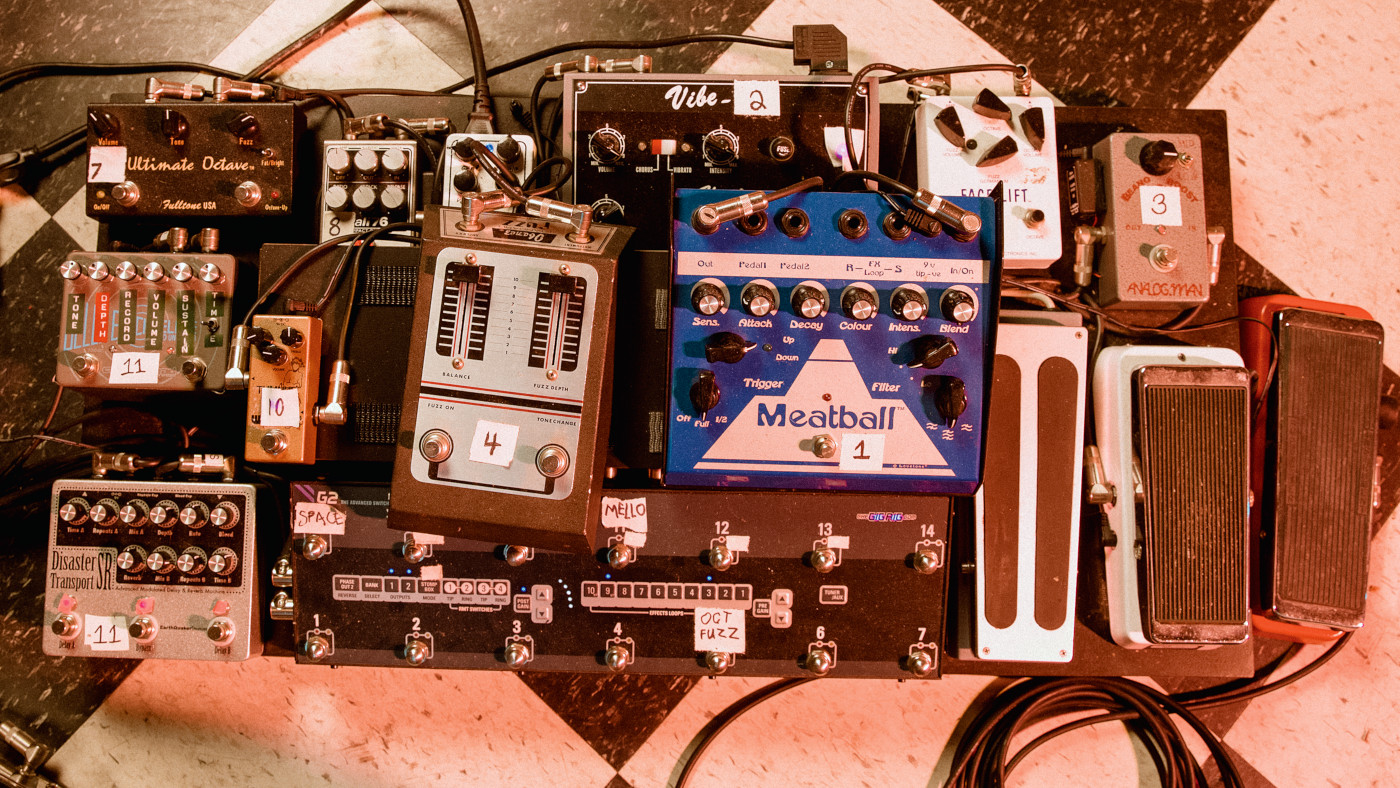
Auerbach’s studio pedal essentials
“This is my pedalboard for the studio,” explains Dan, before we pick through a sample of his boutique and vintage stompbox collection.
“I’ve also got a whole rack next to it that’s connected on a separate switcher that’s all linked up, so I’ve got about 20 wildly different sounds that I can call on instantly. It’s all meant for ease of use, and being able to cut fast.”
Lovetone Meatball
“That’s like an auto-wah [from renowned but defunct UK effects-maker Lovetone]. I didn’t use that on this record, though.”
Analog Man Beano Boost
“I love the Germanium Beano Boost [based on the old Dallas Rangemaster]. I loved the treble booster, I always have. That’s the kind of pedal you leave on all of the time and use the guitar volume control to adjust.”
Shin-Ei Vibe-Bro
“That’s the UniVibe clone that they make down in Texas with a bunch of new-old- stock parts and it’s just a great, interesting sound. Apparently they bought up from the factory an old stock of circuit boards, switches, housings, pedals... it’s just crazy. So they sound like the originals and there’s nothing else like those. It’s a really amazing invention.”
1970s Ibanez Fuzz
“That’s an Ibanez fuzz. It’s basically a Japanese octave fuzz. It’s a pedal that I’ve had for 15 years or more [the pedal itself dates back to the 70s]. I’ve used it on pretty much every Black Keys record I’ve ever made, even the first one.”
Fulltone Ultimate Octave
“The Fulltone is cleaner sounding and less out-of-control. It gives me the cleaner, Octavia-style sound and then the Ibanez gives me that wild, Black Keys sound!”
Prescription Electronics Face Lift
“This is my other octave fuzz - I’ve got three octave fuzzes on the board and they’re all different styles. The octave fuzz side on the Face Lift is one of my favourite fuzz pedals, ever. Just the octave fuzz side, though. It’s fucking awesome. My cousin, Robert Quinewho played for Lou Reed and Richard Hell and The Voidoids, first told me about Prescription Electronics pedals, back when I was 18. I probably have every pedal that company has ever made and they’re all great.”
Catalinbread Belle Epoch Deluxe
“It’s just an analogue delay. I think they try to make the line-amp in it sound like the Maestro Echoplex EP-3 solid-state line-amp, which has a really cool sound. That pedal is just a great analogue delay. There’s a bunch of fun sounds in there.”
TheGigRig G2
“Everything goes through that, except for the wah. It’s essentially a patchbay for my pedals and it’s easy for me to understand and work around. It’s made working in the studio with guitar pedals a lot of fun. The best tools just get out of the way and let you do your thing.”
Matt is a freelance journalist who has spent the last decade interviewing musicians for the likes of Total Guitar, Guitarist, Guitar World, MusicRadar, NME.com, DJ Mag and Electronic Sound. In 2020, he launched CreativeMoney.co.uk, which aims to share the ideas that make creative lifestyles more sustainable. He plays guitar, but should not be allowed near your delay pedals.


